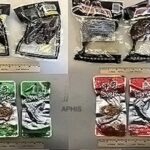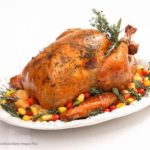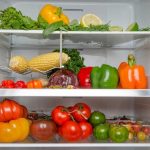Learn about slow cooker food safety with tips from the USDA. Slow cookers are appliances that cook food at lower, but still safe, temperatures, for long periods of time. The food heats up quickly enough to stay safe, but cooks long enough to make tougher ingredients such as cheaper cuts of meat and root vegetables tender over time. There are several appliances that function as slow cookers: The traditional slow cooker, the instant pot, and some pressure cookers that have slow-cook functions. While these appliances are easy to use, there are some rules you need to follow to make sure your food is safe to eat. First, if you plan to use frozen meat, seafood, or poultry, do not add it to the slow cooker when frozen. Thaw it first before adding it to the slow cooker. Do not thaw … [Read more...]
Make Your Super Bowl Party a Safe One With USDA Tips
The Super Bowl is February 13, 2021. If you are hosting guests, make your Super Bowl party a safe one with these tips from the USDA. Whether you choose cold snacks or hot ones or a combination, since the event will last at least four hours, you'll need to keep an eye on the clock. Agriculture Secretary Tom Vilsack said in a statement, "As families and friends safely gather to watch the big game, keep food safety in mind. No matter who you’re rooting for, foodborne illness is a dangerous opponent we face during the game. Millions of people get sick from food poisoning each year. Following guidance on keeping food at safe temperatures, proper handwashing and avoiding cross-contamination will protect you and your party guests." Football fans usually eat throughout the game, which … [Read more...]
APHIS Seized Prohibited Pork From China and Other Meats
APHIS seized prohibited pork sourced from China, along with poultry and ruminant products from New York City retailers in the last three months of 2021, according to a press release from the USDA. APHIS is the Animal and Plant Protection Service branch of that agency. More than 1900 pounds of prohibited products were seized. The foods were sourced from China and didn't have the required import permits and health certificates, and are considered a risk of introducing invasive plant and animal pests and diseases into the country. The prohibited pork from China and other meats were destroyed. These efforts are part of a collaboration between APHIS, the USDA Food Safety and Inspection Service (FSIS), U.S. Customers and Border Protection, and New York City public health … [Read more...]
Where Are All the Recalls? Q3 Recalls Drop More Than 10%
Where are all the recalls? This year could see the lowest food recall levels in ten years. In the third quarter alone, FDA food recalls dropped more than 10%, according to Food Safety Tech. In 2020, food recalls hit an all-time low, partly because of the COVID-19 pandemic. There was an average of 128 recalls per year in the four years before the pandemic hit. In 2020, there were only 29 food recalls. Even more alarmingly, of the three majors pathogens (E. coli, Salmonella, and Listeria monocytogenes) there were 26 recalls in each of the four years before 2020. In 2020, there was only one recall for a pathogen, and that was for E. coli. In 2021, FDA food recalls fell more than 11%. USDA recalls increased by just one. While this drop may be considered good news, it seems odd … [Read more...]
Keep Thanksgiving Leftovers Safe With Tips From the USDA
It's Thanksgiving. One of the best parts of this holiday is leftovers. So you should know how to keep Thanksgiving leftovers safe with these tips from the USDA. When you take foods out of the oven or refrigerator, set a timer and follow the two hour rule. That means that all perishable items such as the turkey, stuffing, side dishes, and desserts should be refrigerated within two hours after coming out of those appliances. After two hours, these foods enter the "danger zone" between 40°F and 140°F, where bacteria can double every 20 minutes. Then, even if you thoroughly reheat those foods, the bacteria could have produced toxins that are not destroyed by heat and can still make you sick. When you break down the foods from the meal, put them into shallow containers so they cool … [Read more...]
USDA Makes Effort to Reduce Poultry Salmonella Illnesses
The USDA announced a new effort to reduce poultry Salmonella Illnesses, to try to achieve a national target of a 25% reduction in those illnesses. Several "key activities" are being launched to gather data and information that is needed to support future action. Agriculture Secretary Tom Vilsack said in a statement, "Far too many consumers become ill every year from poultry contaminated by Salmonella. We need to be constantly evolving in our efforts to prevent foodborne illness to stay one step ahead of the bad bugs. Today we’re taking action to help prevent Salmonella contamination throughout the poultry supply chain and production system to protect public health." USDA Deputy Under Secretary for Food Safety Sandra Eskin said, in a Consumer Federation of America Virtual National … [Read more...]
Raw Breaded Stuffed Chicken Salmonella Outbreak Over According to USDA
The raw breaded stuffed chicken Salmonella outbreak is over, according to the USDA Outbreak Investigation Table, even though the outbreak has not been declared over on the CDC's investigation notice. The CDC investigation has not been updated since August 11, 2021. As of August 10, 2021, 28 people in eight states have been infected with the outbreak strain of Salmonella Enteritidis. Illness onset dates ranged from February 21, 2021 to June 28, 2021. The patient case count by state is: Arizona (1), Connecticut (1), Illinois (9), Indiana (4), Michigan (1), Minnesota (4), Nevada (1), and New York (7). Eleven people are hospitalized because they are so ill. Some of the illnesses have been linked to Kirkwood Chicken, Broccoli and Cheese, a raw breaded stuffed chicken product that is … [Read more...]
Stay Food Safe During Temporary Power Outages With USDA Tips
Did you know that weather-related power outages have increased by 67% since 2000? Aging infrastructure and climate change are stressing our power grid. Because of the increased energy demand, some power grids can experience blackouts. And of course, severe weather can cause extended power outages. Brownouts can also occur when electric providers ask consumers to voluntary conserve energy or a reduced flow of electricity will be scheduled. So learn how you can stay food safe during temporary power outages. To stay food safe, always keep and appliance thermometer in both your refrigerator and freezer to make sure that the temperature stays below 40°F in the fridge and below 0°F in the freezer. Food will stay at a safe temperate run the fridge up to four hours during a power outage. In … [Read more...]
Food Safety Tips During Hurricanes and Severe Storms
With the first named Atlantic hurricane approaching the U.S. mainland, the USDA is offering food safety tips during hurricanes and severe storms. The best thing to do is to be prepared before storms hit. And this advice applies to all Americans, not just those who live in hurricane-prone areas. First, make sure that you keep an appliance thermometer in your refrigerator and freezer. The freezer must be kept at 0°F or below, and the refrigerator between 33°F and 40°F to slow down most bacterial growth. Then, freeze containers of water for ice to help keep food frozen in the freezer or cold in the fridge or in coolers if the power goes out. Make more ice cubes too. You can also use this ice for drinking water if flooding occurs and you need a clean source of water. Freeze … [Read more...]














